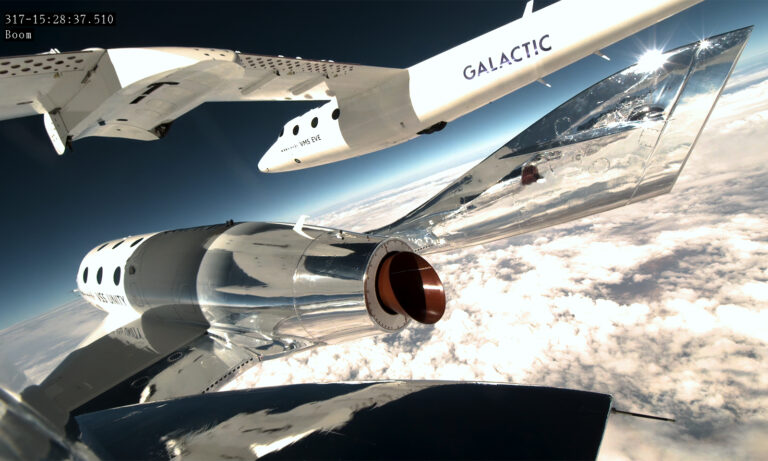Space tourism got a boost — literally — in June when Virgin Galactic sent four paying passengers on an hour-long trip featuring a bird’s-eye view of Earth and three minutes of near-weightlessness.
“It takes a lot of time to understand what just happened,” Turkish researcher and passenger Tuba Atasever said at a news conference after the flight. “It’s not something you can put into words.”
Aspiring astronauts around the world can expect similar excitement in the coming years as Virgin Galactic ramps up testing of parts for its next-generation Delta-class spacecraft at a new facility in Irvine. The company’s expansion is another sign of Irvine’s rapid growth as an aerospace hub.
“Fertile ground for recruitment”
Over the past decade, other major companies have also located and expanded in Irvine, including Virgin Galactic’s main rival, SpaceX; Terran Orbital, the world’s largest provider of nano- and microsatellites; Turion Space, which makes commercial satellites to track and remove space debris; and Finnish satellite manufacturer IceEye. Taking advantage of the nation’s best-educated workforce and a vibrant high-tech ecosystem, these companies are building and testing spacecraft and even developing flying taxis. In the process, they’re putting Irvine at the forefront of a globally booming industry worth as much as $856 billion.
“The Irvine area is a very good place to recruit,” said Steve Justice, Virgin Galactic’s vice president of cosmic programs and engineering, adding that the company hopes to build a steady pipeline of talent, from graduate students with technical degrees to mid-career engineers.
“Also, the fantastic weather and great atmosphere for professionals, both singles and families, helps attract talent,” he said.
Virgin Galactic is moving its headquarters to near Irvine in 2022 and doubling its workforce. The company’s new facility in Hubble Industrial Park will test parts for the Delta spacecraft, which will replace the VSS Unity model that made its final flight in June. Final assembly of the Delta spacecraft will take place in Phoenix.
Are you ready to reach for the stars?
Virgin Galactic has a waiting list of about 700 people willing to pay $450,000 for the short space trip, but it has suspended new flights until its Delta planes are ready. The company plans to resume trips in 2026, after which the price will rise to $600,000. (SpaceX’s price for longer, deeper journeys into space is estimated at $55 million.) The new ship will carry six passengers and fly up to three times a week for a total of 125 missions per year, which should clear the waiting list fairly quickly.
“The new Delta class spacecraft are going to be amazing,” said the company’s founder, British entrepreneur Richard Branson. “It’s going to be like building plane after plane. Over time, the prices will come down and more people will be able to go into space.”
“The Irvine area is a great place to recruit, with great weather and a great environment for single professionals and families, which helps us retain top talent.”
Steve Justice, Virgin Galactic’s vice president of Spaceline Programs and Engineering
In addition to Atasevar and the two pilots, the June travelers included an Israeli real estate developer, an Italian hotelier and a SpaceX engineer from California.
Hundreds of spectators, including Branson, gathered at Spaceport America near Truth or Consequences, New Mexico, to watch the spacecraft, VSS Unity, coupled to the catamaran mother ship, VMS Eve, disappear from view. The two craft separated at an altitude of 45,000 feet, catapulting the first-time astronauts to an altitude of about 55 miles, just above NASA’s definition of space.

